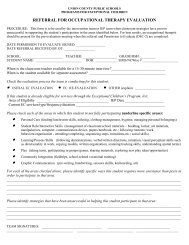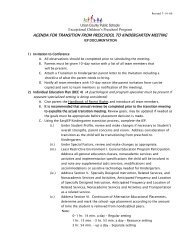Confidentiality of Student Records - UCPS - Exceptional Children ...
Confidentiality of Student Records - UCPS - Exceptional Children ...
Confidentiality of Student Records - UCPS - Exceptional Children ...
You also want an ePaper? Increase the reach of your titles
YUMPU automatically turns print PDFs into web optimized ePapers that Google loves.
2. EC student’s records are sent from the school to the <strong>Exceptional</strong> <strong>Children</strong>’s Office when a student<br />
graduates from high school. The parents <strong>of</strong> graduating seniors are notified that they may request a<br />
copy <strong>of</strong> the entire file from Central Services.<br />
D. PARENT AND STUDENT ACCESS TO RECORDS<br />
1. Each parent <strong>of</strong> a dependent child shall have access to the child’s records. “Parent” means either the<br />
natural parent, the legal guardian, or the person acting as a parent in the absence <strong>of</strong> the natural<br />
parent.<br />
2. Upon reaching age eighteen, students or former students assume their rights regarding records and<br />
placement.<br />
3. When a parent or legal guardian is providing more than half <strong>of</strong> the support <strong>of</strong> the pupil who is at<br />
least eighteen years old, the parent may retain access to the pupil’s records without the pupil’s<br />
consent. However, the parent does not exercise any other rights regarding the records.<br />
4. In some cases the parents will pursue a Court hearing to have the student declared incompetent at<br />
age eighteen. After being presented a copy <strong>of</strong> such a Court document, the school will give the<br />
parents full rights to the student’s records and placement.<br />
5. At any time a parent or adult student requests access to the <strong>Exceptional</strong> <strong>Children</strong>’s folder, qualified<br />
school personnel shall be present to interpret the record.<br />
6. Access to a record shall be granted within a reasonable amount <strong>of</strong> time not to exceed fortyfive<br />
(45) days. However, the goal <strong>of</strong> the Union County <strong>Exceptional</strong> <strong>Children</strong>’s Program is that access,<br />
with a interpretive conference, should be provided within fifteen (15) working days. The school<br />
psychologist should be present to interpret evaluation data. If the student has not had a<br />
psychological evaluation, such as with a child placed as speech impaired, the speech/language<br />
specialist or other specialist should be present for the interpretive.<br />
7. After interpretation, parents shall have the right to request copies <strong>of</strong> the records or portions <strong>of</strong> the<br />
records. (Protocols <strong>of</strong> restricted tests, such as the Wechsler Intelligence Scale for <strong>Children</strong>, are not<br />
placed in the student’s record and may not be copied for distribution to the parent.)<br />
8. There is no charge for copy <strong>of</strong> records being sent to a parent or to another school unit.<br />
E. PARENT REQUEST TO AMEND RECORDS<br />
1. Each parent and eligible student has the right to inspect, disagree with, and request that information<br />
be amended or deleted. This would be based upon the belief that the information is inaccurate,<br />
misleading or otherwise in violation <strong>of</strong> the privacy, rights <strong>of</strong> the pupil or parent. The parent and<br />
eligible student also have the right to request that additional information be added to the student<br />
records.<br />
2. The parent should place in writing the request to amend the student’s records. The parent should<br />
sign the statement which explains the nature <strong>of</strong> the objection <strong>of</strong> the questioned record.<br />
3. The <strong>Exceptional</strong> <strong>Children</strong>’s Department Chairperson and other appropriate staff members should<br />
meet informally with the parent in an effort to resolve the dispute over the challenged contents <strong>of</strong><br />
the records.<br />
4. The meeting can result in the decision for information to be amended, deleted, added, or for an<br />
independent evaluation to be provided.<br />
5. If no resolution can be reached, the issue should be referred to the district level. If a resolution<br />
cannot be reached after attempts at the district level, mediation or a hearing can be requested by<br />
either parent or the school system.
















